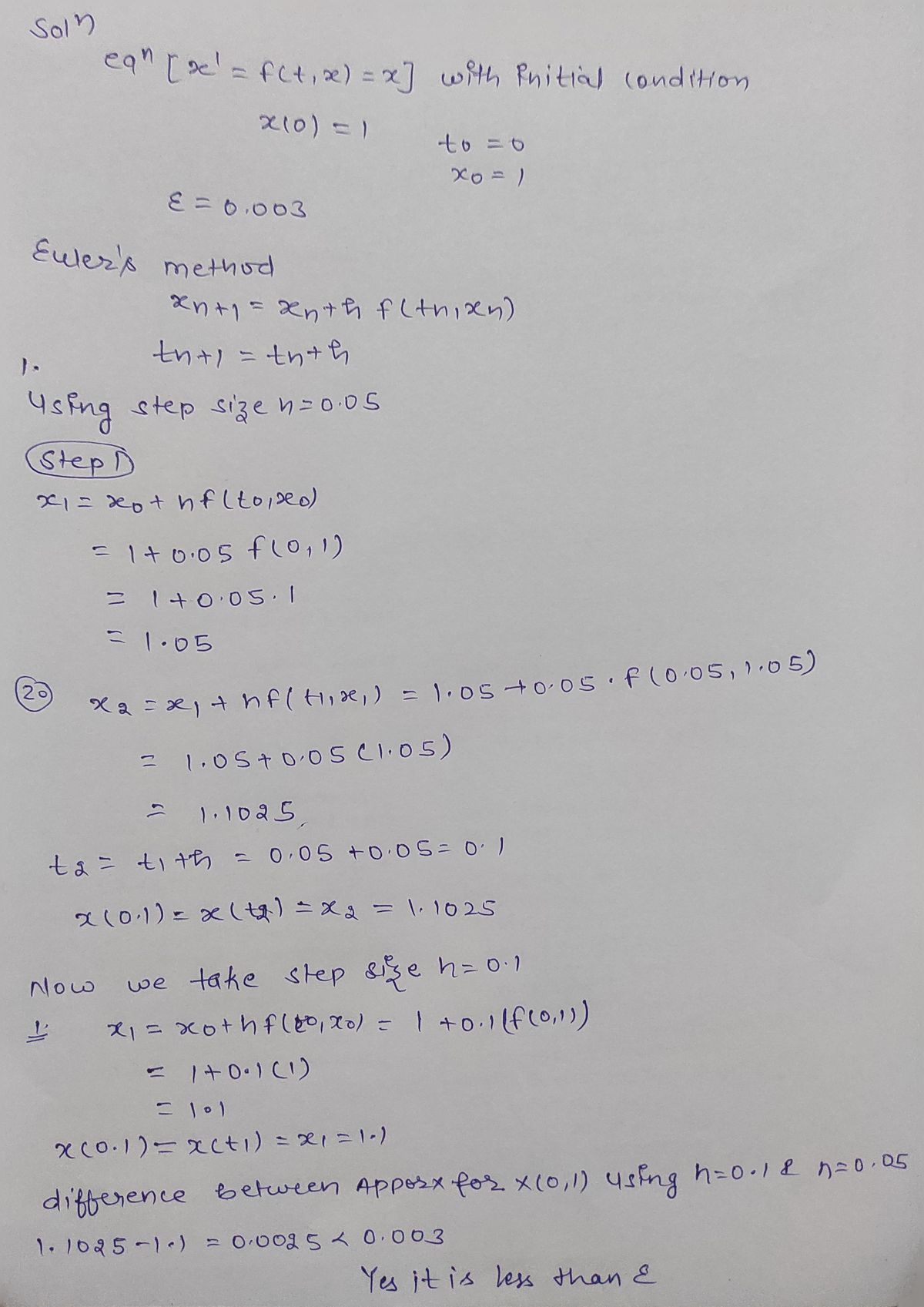Exercise 4: Recall that in Exercise 3 we looked at Euler's method applied to the equation x = x with initial condition x(0) = 1. Suppose that our error tolerance is € = 0.003. Let's see when our h = 0.1 Euler approximation might run into trouble with this. (1) Calculate a new Euler approximation for x(0.1) using h = 0.05 (you'll now have two steps). What's the difference between your approxima- tions for x(0.1) using h= 0.1 and h= 0.05? Is it less than €? (2) If the difference is less than £, we assume that the solution with the larger h is fine at t = 0.1. (This should be the case!) Calculate a new estimate for x(0.2) using the initial condition x(0.1) = 1.1 (the
Exercise 4: Recall that in Exercise 3 we looked at Euler's method applied to the equation x = x with initial condition x(0) = 1. Suppose that our error tolerance is € = 0.003. Let's see when our h = 0.1 Euler approximation might run into trouble with this. (1) Calculate a new Euler approximation for x(0.1) using h = 0.05 (you'll now have two steps). What's the difference between your approxima- tions for x(0.1) using h= 0.1 and h= 0.05? Is it less than €? (2) If the difference is less than £, we assume that the solution with the larger h is fine at t = 0.1. (This should be the case!) Calculate a new estimate for x(0.2) using the initial condition x(0.1) = 1.1 (the
Advanced Engineering Mathematics
10th Edition
ISBN:9780470458365
Author:Erwin Kreyszig
Publisher:Erwin Kreyszig
Chapter2: Second-order Linear Odes
Section: Chapter Questions
Problem 1RQ
Related questions
Question
Please show all work for exercise #4!

Transcribed Image Text:estimate using h = 0.1) and a step size of h = 0.05. Is the difference
between the h = 0.1 and h= 0.05 approximations still less than e?
(3) If it is (it should be), do two more steps with h = 0.05, again starting
with the value for x(0.2) given by the Euler calculation with h = 0.1.
Notice that the error at the end of this step is bigger than €: this would
results in an adaptive stepsize routine decreasing the step size to be
sure that the error is in check.

Transcribed Image Text:Exercise 4: Recall that in Exercise 3 we looked at Euler's method applied
to the equation x' = x with initial condition x(0) = 1. Suppose that
our error tolerance is € = 0.003. Let's see when our h = 0.1 Euler
approximation might run into trouble with this.
(1) Calculate a new Euler approximation for x(0.1) using h = 0.05 (you'll
now have two steps). What's the difference between your approxima-
tions for x(0.1) using h= 0.1 and h= 0.05? Is it less than €?
(2) If the difference is less than , we assume that the solution with the
larger h is fine at t = 0.1. (This should be the case!) Calculate a
new estimate for x(0.2) using the initial condition x(0.1) = 1.1 (the
Expert Solution
Step 1: We use Euler's method

Step by step
Solved in 4 steps with 3 images

Recommended textbooks for you

Advanced Engineering Mathematics
Advanced Math
ISBN:
9780470458365
Author:
Erwin Kreyszig
Publisher:
Wiley, John & Sons, Incorporated

Numerical Methods for Engineers
Advanced Math
ISBN:
9780073397924
Author:
Steven C. Chapra Dr., Raymond P. Canale
Publisher:
McGraw-Hill Education

Introductory Mathematics for Engineering Applicat…
Advanced Math
ISBN:
9781118141809
Author:
Nathan Klingbeil
Publisher:
WILEY

Advanced Engineering Mathematics
Advanced Math
ISBN:
9780470458365
Author:
Erwin Kreyszig
Publisher:
Wiley, John & Sons, Incorporated

Numerical Methods for Engineers
Advanced Math
ISBN:
9780073397924
Author:
Steven C. Chapra Dr., Raymond P. Canale
Publisher:
McGraw-Hill Education

Introductory Mathematics for Engineering Applicat…
Advanced Math
ISBN:
9781118141809
Author:
Nathan Klingbeil
Publisher:
WILEY

Mathematics For Machine Technology
Advanced Math
ISBN:
9781337798310
Author:
Peterson, John.
Publisher:
Cengage Learning,

